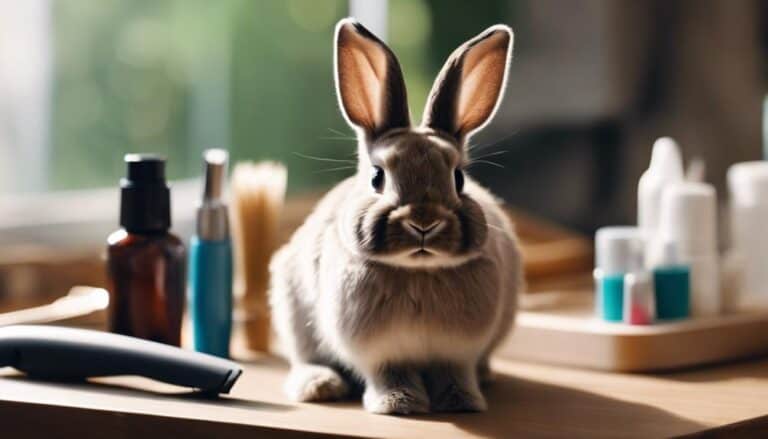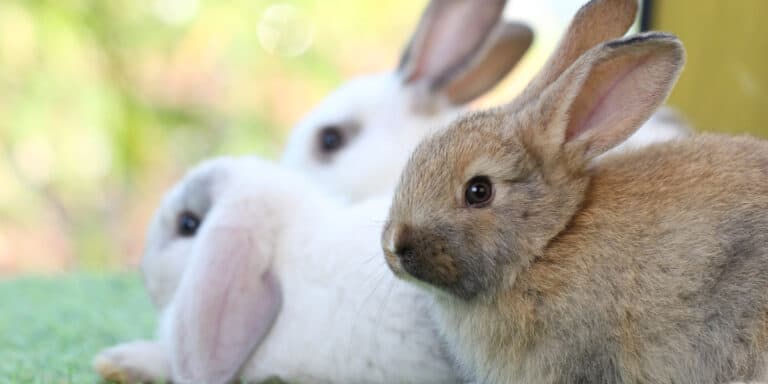If you've ever wondered how to help your rabbit unwind, the key lies in understanding their stress triggers. Providing a serene habitat and engaging in interactive play can greatly ease their tension.
But what about those subtle signs of stress that often go unnoticed? Stay tuned to uncover practical strategies that not only alleviate stress but also foster a harmonious bond with your furry companion.
Contents
- 1 Key Takeaways
- 2 Minimize Loud Noises
- 3 Provide a Comfortable Environment
- 4 Establish a Consistent Routine
- 5 Allow Time for Bonding
- 6 Offer Enriching Toys
- 7 Ensure Adequate Attention
- 8 Recognize Signs of Stress
- 9 Seek Veterinary Guidance
- 10 Frequently Asked Questions
- 11 What Are Some Strategies for Managing Rabbit Stress as They Age?
- 12 Conclusion
Key Takeaways
- Minimize loud noises and provide a calm environment for rabbits to reduce stress.
- Establish a consistent routine for feeding, exercise, and playtime to promote stability.
- Create a safe and trusting environment with hiding spots and gentle handling techniques.
- Enrich the rabbit's environment with stimulating toys for physical and mental engagement.
Minimize Loud Noises
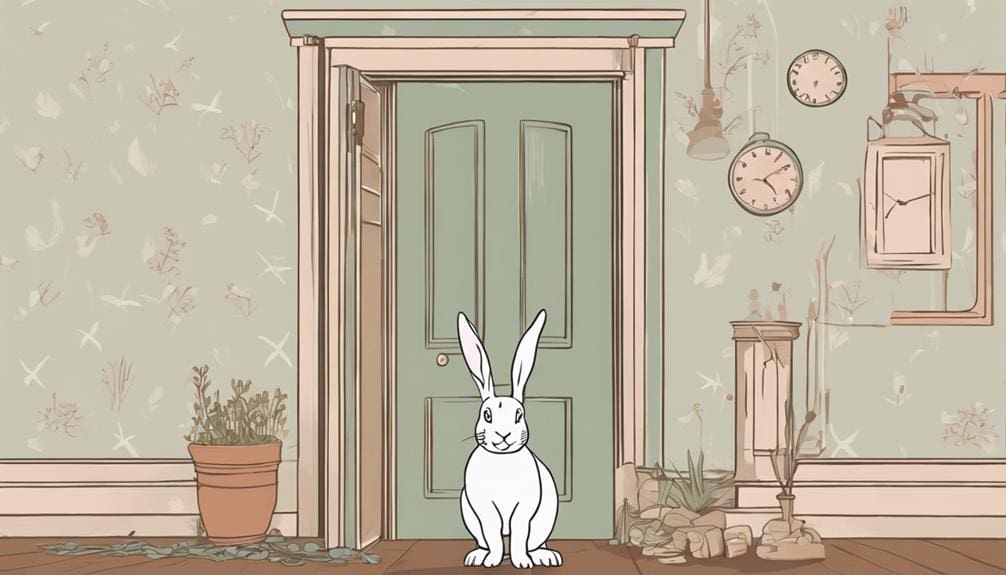
To effectively manage rabbit stress, minimize loud noises in their environment to create a quiet and peaceful atmosphere conducive to their well-being. Rabbits are sensitive creatures that can easily get stressed by loud, unfamiliar noises such as yelling or barking. These noises can't only scare them but also cause discomfort, impacting their overall health.
It's important to pay attention to your rabbit's reactions to different sounds and adjust their environment accordingly to reduce stress. Loud TV sounds or sudden noises can trigger fear responses in rabbits, affecting their mental and physical well-being.
Provide a Comfortable Environment
Creating a comfortable environment for your rabbit is crucial for promoting their well-being and reducing stress levels. Here are some tips to guarantee your pet rabbit has a cozy and stress-free living space:
- Provide hiding spots: Rabbits need places to hide, such as cardboard boxes or tunnels, where they can retreat when they feel anxious or stressed.
- Offer enrichment: Stimulate your rabbit's mind by providing toys, tunnels, and puzzle feeders to keep them engaged and prevent boredom.
- Guarantee safety: Make sure the enclosure is free from hazards, with no wires or toxic plants within reach, to create a safe environment for your rabbit.
- Allow ample space: A spacious enclosure gives your rabbit room to exercise and explore, reducing feelings of confinement and promoting physical activity.
- Maintain cleanliness: Regularly clean the enclosure, litter box, and food and water dishes to ensure a hygienic environment that contributes to your rabbit's overall well-being.
Establish a Consistent Routine
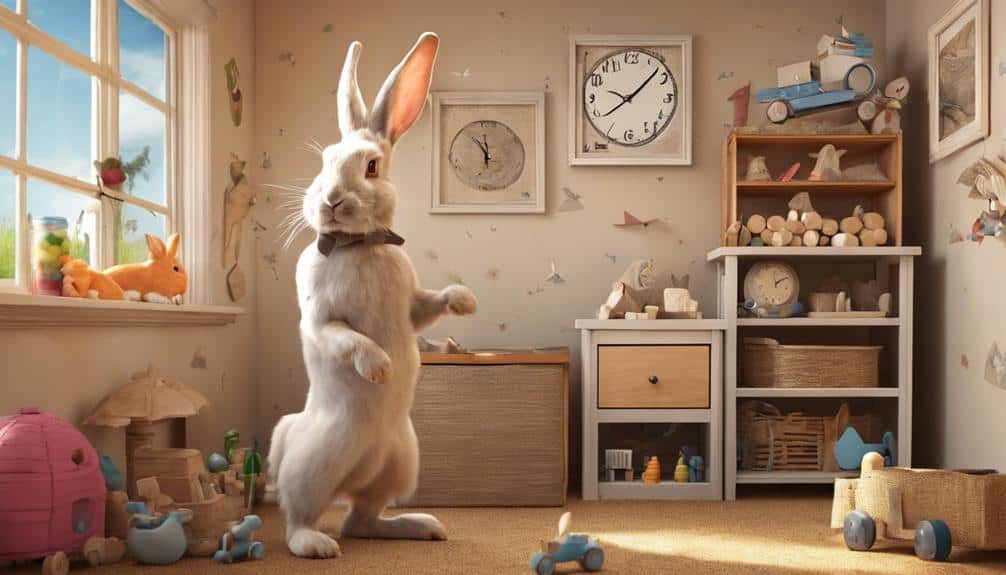
To secure your rabbit's well-being, establishing a consistent routine is essential. This routine should cover feeding times, exercise schedules, and daily care tasks.
Routine for Stress Reduction
Establishing a consistent routine is key to reducing stress in rabbits and promoting their overall well-being. Consistency offers predictability and stability, important for reducing stress in your pet.
To help your stressed rabbit, consider the following:
- Feeding and Exercise Schedule: Set regular times for feeding and exercise to provide stability.
- Scheduled Activities: Incorporate playtime, grooming, and interactions at specific times for security.
- Daily Habits: Maintain consistent daily habits to create a familiar environment.
- Structure and Control: Routine aids in reducing anxiety by offering a sense of control.
- Adaptation: Following a regular routine helps rabbits adapt to changes, enhancing their mental health.
Establishing and sticking to a routine can significantly benefit your rabbit's well-being.
Daily Care Consistency
Maintain a consistent daily care routine for your rabbit to make their well-being a priority and reduce stress effectively. Establish a regular feeding schedule to provide stability and predictability for your rabbit.
Stick to a daily routine for exercise and playtime, as it helps your rabbit feel secure and confident. Consistency in interactions and handling is key to building trust and reducing anxiety in rabbits.
By creating a structured routine, you can help your rabbit adapt better to their environment and lower their stress levels. Daily care consistency, including grooming and cage cleaning, promotes a sense of security and well-being in rabbits.
Predictable Environment Setup
Creating a consistent routine for feeding, playtime, and interactions is important to providing predictability and reducing stress for your rabbit. To establish a predictable environment setup, consider the following:
- Set a fixed schedule for feeding to help your rabbit feel secure.
- Stick to regular playtime sessions to reduce uncertainty and anxiety.
- Maintain consistent interactions to build your rabbit's confidence.
- Guarantee predictability in routines to minimize stress from unexpected changes.
- Offer a stable environment by providing a structured routine for your rabbit's well-being.
Allow Time for Bonding
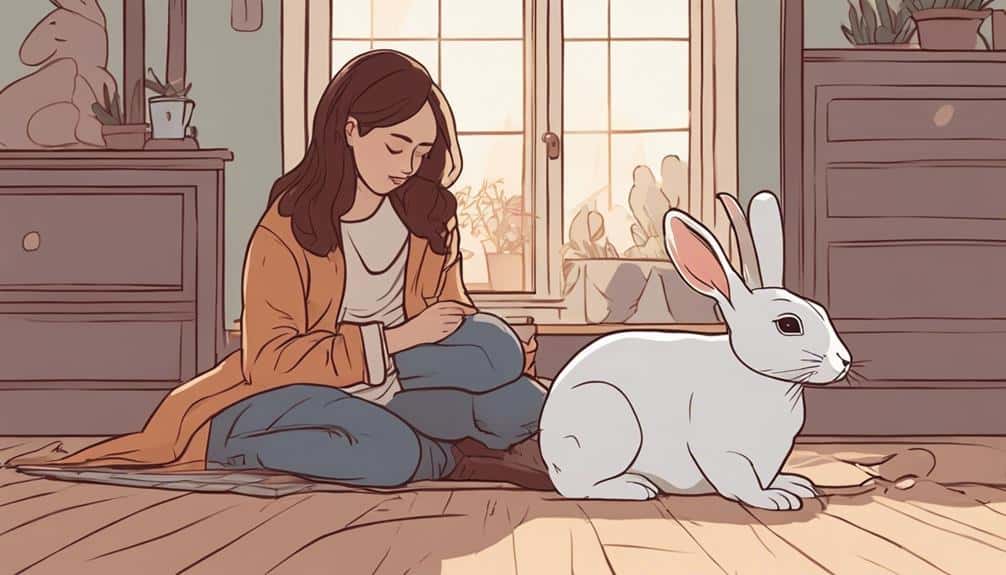
When bonding with your rabbits, providing them with quiet and safe spaces where they can feel secure is crucial.
Using gentle handling techniques can help create a positive environment for bonding.
Quiet, Safe Spaces
To aid in managing rabbit stress effectively, make certain they have access to quiet and safe spaces that allow for bonding and relaxation. Rabbits benefit greatly from having areas where they can feel secure and calm. Here are some tips for creating these spaces:
- Provide hiding spots like cozy boxes or tunnels for comfort.
- Allow rabbits time to bond in a calm environment to foster trust.
- Help rabbits acclimate to new environments and people by offering quiet spaces.
- Create a peaceful setting to promote relaxation and encourage exploration.
- Guarantee rabbits have the freedom to interact more freely by offering safe and quiet areas.
Gentle Handling Techniques
Implement gentle handling techniques by allowing sufficient time for bonding with your rabbit to build trust and reduce stress effectively. Rabbits, as prey animals, rely on a social structure that values safety and security.
When handling your rabbit, focus on petting behind their ears and forehead to establish a positive bond. Watch for signs of relaxation in their body language to make sure they feel safe and comfortable.
Cupping your hands over their face can create a calming environment by reducing stimuli. Speak softly and move slowly to prevent triggering fear responses.
Offer Enriching Toys
Introducing enriching toys, such as chew toys, puzzle feeders, and tunnels, is essential for reducing stress in rabbits by providing mental stimulation and engagement. By incorporating a variety of enriching toys into your rabbit's environment, you can help promote their overall well-being and happiness.
Here are some key points to contemplate when offering enriching toys to your rabbit:
- Encourage Natural Behaviors: Toys that promote activities like digging, chewing, and foraging can help alleviate boredom and anxiety in rabbits.
- Promote Physical Activity: Interactive toys such as treat balls or rolling toys can stimulate physical activity and mental engagement.
- Prevent Habituation: Rotate toys regularly and introduce new ones to prevent habituation and maintain your rabbit's interest.
- Variety is Key: Offering toys with different textures, shapes, and sizes can cater to your rabbit's preferences and play styles.
- Reduce Stress Levels: Enriching your rabbit's environment with a variety of toys can help reduce stress levels and create a stimulating space for your furry friend.
Ensure Adequate Attention
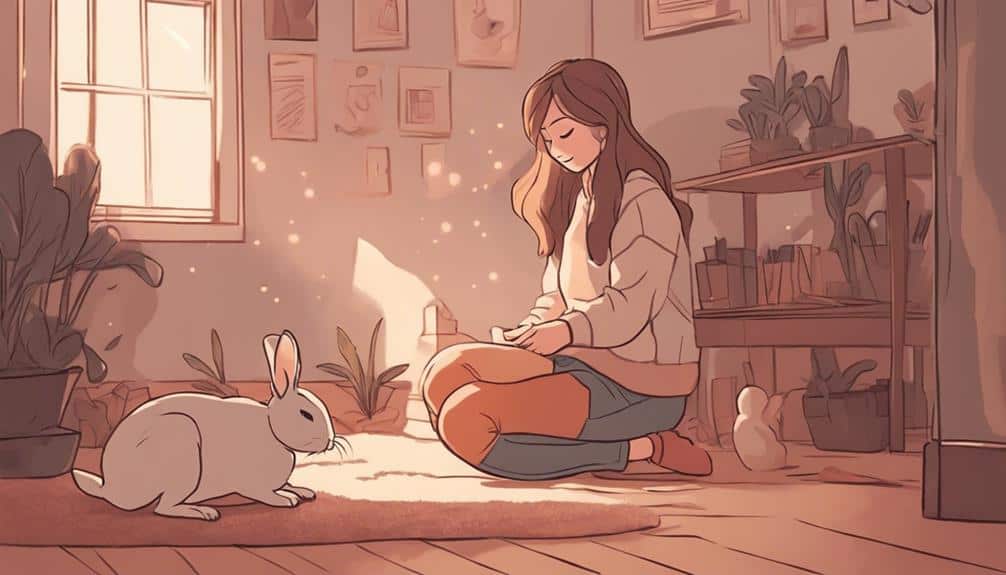
By providing your rabbit with regular, quality time and gentle interaction, you can guarantee they receive the attention and companionship necessary for their well-being. Spending time with your pet rabbit is important for developing a strong bond and ensuring they feel secure and loved.
Engage in daily petting sessions and communicate through soft words to build trust and reduce stress levels. Make sure to establish a predictable routine that includes dedicated time for interaction and play. Monitor your rabbit's behavior closely to assess if they're getting the attention they need for their mental well-being.
Recognize Signs of Stress
Recognizing signs of stress in rabbits is essential for maintaining their well-being and addressing any potential issues promptly. Here are some key signs to look out for to help your rabbit when they're feeling stressed or anxious:
- Lethargy: If your rabbit is unusually inactive or lacks energy, it could be a sign of stress.
- Hiding behavior: Rabbits may retreat to secluded areas when stressed, so take note if your rabbit is spending more time hiding.
- Aggressive actions: Actions like charging or biting can indicate stress in rabbits and should be addressed carefully.
- Changes in habits: Keep an eye on any changes in eating, bathroom habits, or vocalizations as they could signal stress.
- Unusual behaviors: Pay attention to unusual behaviors like excessive grooming, nipping, or avoiding interaction, as these can be signs of stress in rabbits.
Seek Veterinary Guidance
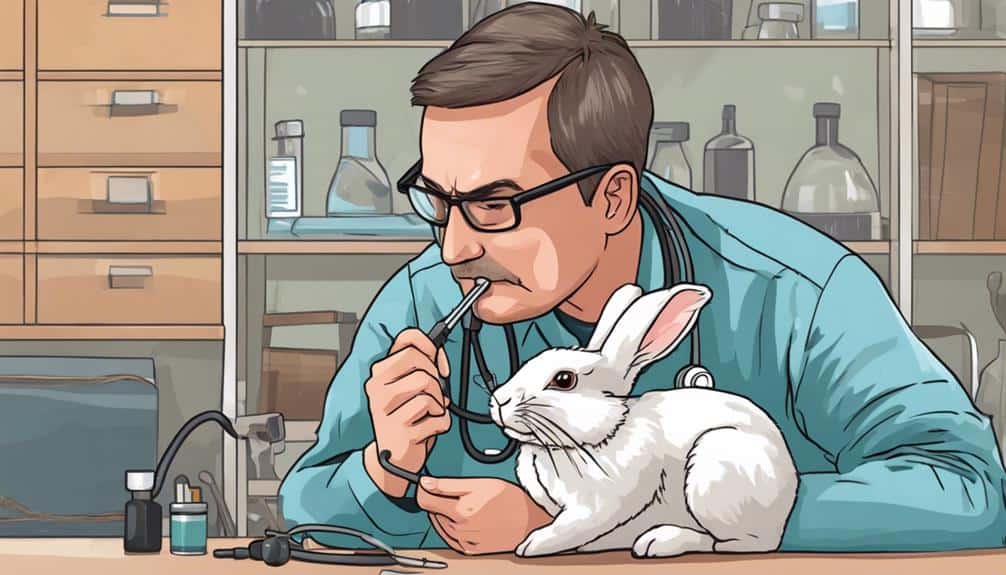
When managing rabbit stress, it's essential to seek veterinary guidance for tailored advice and treatment options. Veterinarians play an important role in helping you address stress-related issues in your rabbits. Regular check-ups with a knowledgeable veterinarian not only allow for monitoring of your rabbits' well-being but also enable early intervention for any stress-related issues that may arise. Veterinary guidance is particularly important as it aids in identifying underlying health problems that could be contributing to your rabbits' stress levels.
A veterinarian can recommend specific calming techniques, medications, or behavior modifications tailored to alleviate your rabbit's stress. By seeking veterinary guidance, you make sure that the stress management plan implemented is safe and appropriate for your individual rabbit's needs. This professional advice can make a significant difference in effectively managing and reducing stress in your rabbits, promoting their overall well-being and quality of life.
Frequently Asked Questions
How Can I Reduce My Rabbits Stress?
To reduce your rabbit's stress, engage in bonding activities and establish a grooming routine. Create safe spaces with enrichment toys, play calming music, and consider massage therapy for relaxation. Stay observant of your rabbit's reactions for best care.
What Are the Strategies for Managing Stress?
Take a deep breath, engage in play therapy, and consider herbal remedies to manage stress. Prioritize self-care, seek support, and embrace relaxation techniques. Remember, managing stress is about finding balance and nurturing your well-being.
What Are the Five Stress Management Techniques?
To manage stress effectively, practice breathing exercises and mindfulness. Engage in play therapy and social interaction. Provide environmental enrichment and maintain routine consistency. These techniques promote well-being and reduce stress levels in a holistic way.
What Are the Techniques for Stress Relief?
To find stress relief, engage in calming activities like breathing exercises and mindfulness practice. Implement stress-reducing techniques and seek emotional support. These relaxation methods can aid in managing stress levels effectively and promoting overall well-being.
What Are Some Strategies for Managing Rabbit Stress as They Age?
When it comes to optimizing rabbit aging care, there are several strategies for managing rabbit stress as they age. Providing a quiet and comfortable environment, ensuring a proper diet, and regular vet check-ups are key. Additionally, offering mental stimulation and social interaction can help reduce stress in aging rabbits.
Conclusion
To sum up, by creating a peaceful sanctuary for your rabbit, filled with quiet corners and stimulating toys, you can help alleviate their stress and promote their well-being.
Imagine a cozy hideaway where your furry friend can hop and play freely, surrounded by familiar sights and sounds.
Remember, your attentiveness and care are key to ensuring a happy and stress-free life for your beloved rabbit.



